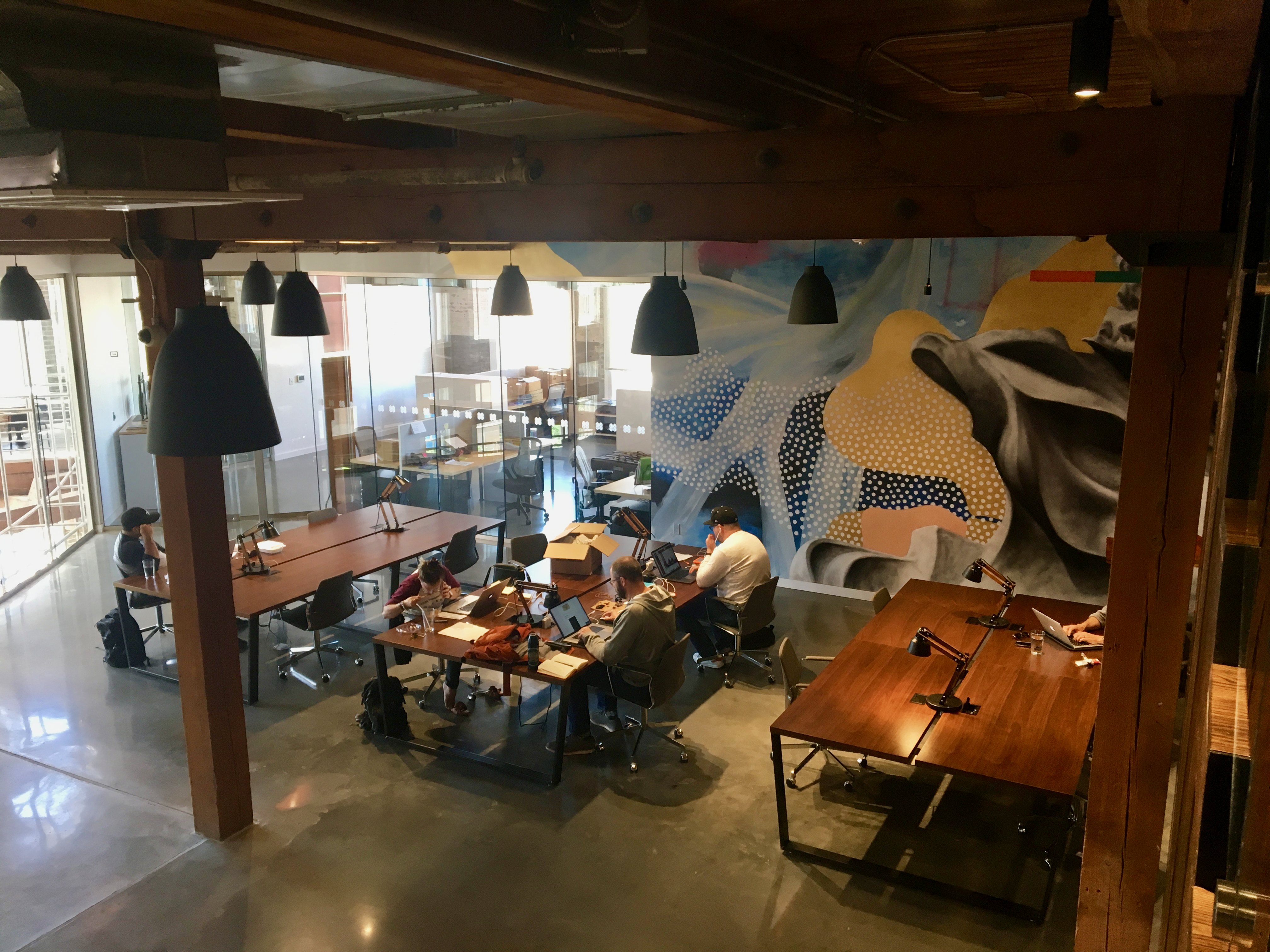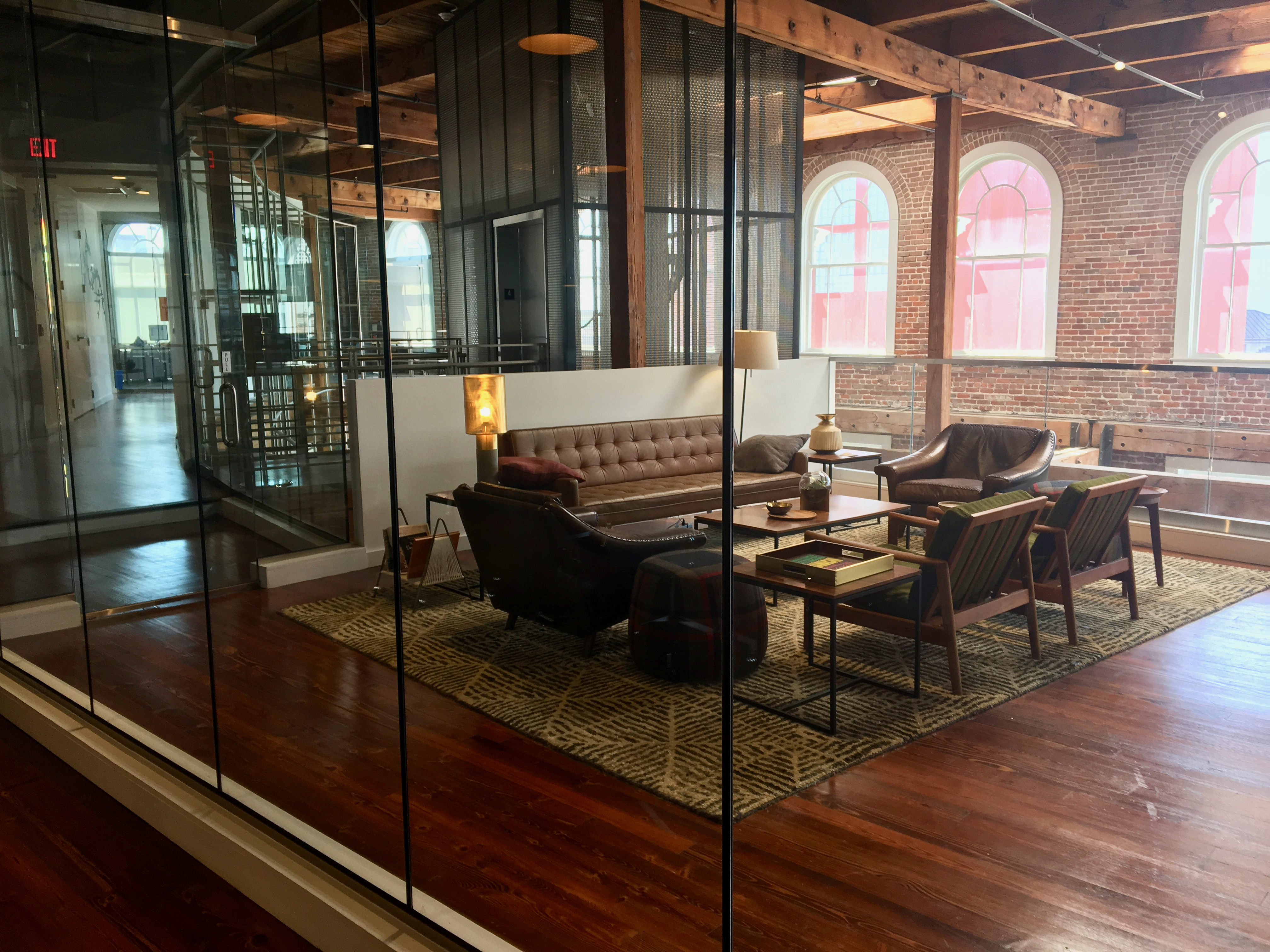Leasing office space is pricey for founders and startup entrepreneurs.
To help businesses skirt around this issue, companies like Launch Pad and The Shop have opened co-working spaces around the city that cater to the entrepreneurs and startups that struggle to find cost-effective office spaces. By eliminating the need for a traditional five-year lease, cutting overhead costs, and allowing entrepreneurs to take on more space as they grow, co-working spaces make more financial sense for early-stage startups. Plus, they allow founders to focus on building their businesses rather than worrying about finding an office or hiring an office manager.

The common area at The Shop (photo by: Jake Gindy)
And there’s free coffee all day long.
Although there have been co-working spaces popping up around New Orleans for decades, Launch Pad was founded in 2009, and is one of the most well-know spaces in the city.
The influx of entrepreneurs into New Orleans after Hurricane Katrina presented people like Launch Pad Co-founder and CEO Chris Schultz with an opportunity. Schultz wanted to help businesses develop in the wake of the storm and grow a culture of entrepreneurial collaboration in New Orleans. “It took a couple years for everyone to get back on their feet,” he says. “There was a big emphasis to not just rebuild New Orleans back to what it once was, but to what it could be,” Schultz tells me as we discussed the early years of Launch Pad. As he says,“We took it as a blank slate for the future.”
Schultz figured getting everyone together, regardless of the fact that they were all working on different projects, “would be fun and provide opportunities for collaboration and growth.”
Eight years later, in October of 2017, The Shop opened its doors in the Central Business District. It has quickly become the largest co-working space in the city. Together with Launch Pad, they exemplify the design principles that make co-working spaces so attractive to entrepreneurs and small business owners. Schultz says a large part of developing a co-working space is creating a communal atmosphere. “It’s designed almost like a home.”
 The Shop at the Contemporary Arts Center (photo by: Jake Gindy)
The Shop at the Contemporary Arts Center (photo by: Jake Gindy)
With a layout that looks like a hybrid of a modern living room–furnished with cozy armchairs and coffee tables–and a trendy, collaboration-focused tech startup HQ full of USB/power integrated desks and communal kitchens/bar areas, The Shop is a uniquely homey work environment that offers the amenities of a well-equipped office space.
So much of the growth that members and their businesses experience at The Shop comes down to “the physical space itself,” The Shop’s Marketing Director Megan McNeill explains. Collaboration is a key aspect of co-working spaces that business owners and entrepreneurial thinkers find so attractive. The types of businesses that operate out of the shop vary so drastically, yet have much to offer one another as they develop. Natalia Vergara, The Shop’s Community Specialist agrees and adds, “creating a space where people actually talk to each other is awesome. Offering a space that facilitates that is one of The Shop’s biggest goals.”

Rooftop workspace at The Shop (photo by: Jake Gindy)
In addition to its modern wood and metal aesthetic, The Shop attracts entrepreneurs and small business owners by offering business development programs, mail & package delivery, and discounts and support services from The Shop’s partner companies. As a result, more than 60 companies call The Shop home.
Reflecting on the success of The Shop’s community of businesses, McNeill tells me that, “everything we do, from marketing workshops to our discussion series, is all in pursuit of our mission to support the entrepreneurial and small business ecosystem of the city.”
Even though these co-working spaces offer cheaper options for start-ups and entrepreneurs, the $200+ price tag on a membership at a traditional co-working space is often out of reach for some, like Fund 17 stakeholders. According to Fund 17 Founder and Executive Director Haley Burns, micro-entrepreneurs, which are underserved, early stage entrepreneurs, might only need access to printing, Wi-Fi, and a laptop computer in order to grow their businesses. To break down this financial barrier to entry, Fund 17 is partnering with Alembic Community Development to create The Fund 17 Community at The Rose Collaborative, a co-working space focused on the financial and physical needs of micro-entrepreneurs.
Set to open in July 2018, the Fund 17 co-working space will house a common area, mailing center, incubator, printers, and offer services like rentable laptops as part of their membership program. The organization will utilize a tiered system that offers memberships as low as $10-$15 per month.

Fund 17 Brand (photo by: Tyler Gindraux)
Burns notes that affordable access to the amenities of a co-working space can make a big difference in the early stages of micro-entrepreneurs’ businesses. “Our entrepreneurs just need access to some resources when they have time to come in and use our creative services, use our equipment, take meetings,” she says. There is also an equipment lab in the works to offer members access to tablets, Square readers, and cameras–differentiating Fund 17’s space from others like Launch Pad and The Shop. “We want to focus more on the creative needs of businesses, which is something that will set us apart,” says Burns.
You can learn more about the services, memberships, and communities of these co-working spaces here: Launch Pad, The Shop, Fund 17.
 NOLAbeings Multimedia artist Claire Bangser created NOLAbeings as a portrait-based story project that marries...
NOLAbeings Multimedia artist Claire Bangser created NOLAbeings as a portrait-based story project that marries...  Voodoo in New Orleans: Reviving history: New Orleans fortune telling This article takes a deep dive into the history of Voodoo in New Orleans, its hybridization with Catholicism, and its present-day place in the city's culture. The author visits fortune-tellers in the French Quarter, using their guidance as a tool for introspection rather than a deterministic predictor of the future. Through her experiences in New Orleans, the author feels a mystical connection to both the past and the future.
Voodoo in New Orleans: Reviving history: New Orleans fortune telling This article takes a deep dive into the history of Voodoo in New Orleans, its hybridization with Catholicism, and its present-day place in the city's culture. The author visits fortune-tellers in the French Quarter, using their guidance as a tool for introspection rather than a deterministic predictor of the future. Through her experiences in New Orleans, the author feels a mystical connection to both the past and the future. 